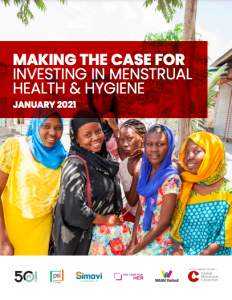In a new report, leading global health organisations have unveiled an analysis outlining what donors, national governments, and the private sector need to invest to accelerate progress for menstrual health and hygiene (MHH). The report, ‘Making the Case for Investing in Menstrual Health and Hygiene’, is part of a growing effort to advance gender equality and contribute to achieving the Sustainable Development Goals.
 Ensuring good and safe menstrual health and hygiene (MHH) contributes to the overall health and well-being of women and girls[1] around the world, and yet roughly 500 million women and girls face limitations when it comes to managing their menstruation. From poverty reduction and stronger economies to healthier populations and better educational outcomes, the benefits of investing in MHH are far-reaching, but despite an increased interest in MHH in recent years, the available funding in this space still does not match the current needs.
Ensuring good and safe menstrual health and hygiene (MHH) contributes to the overall health and well-being of women and girls[1] around the world, and yet roughly 500 million women and girls face limitations when it comes to managing their menstruation. From poverty reduction and stronger economies to healthier populations and better educational outcomes, the benefits of investing in MHH are far-reaching, but despite an increased interest in MHH in recent years, the available funding in this space still does not match the current needs.
‘We found that the absence of comprehensive MHH programs is not due to a lack of agreement about the benefits, but rather uncertainty in what constitutes best practices in terms of implementation and funding,’ said Odette Hekster, Managing Director of PSI-Europe and expert in sexual health and reproductive rights (SRHR).
To ensure the report would meet cross-sectoral needs, it was developed in consultation with government leaders, commercial partners, advocates, funders, and implementing partners over a series of interviews and virtual consultations. The resulting multi-tiered strategy combines programming, research, and advocacy for the holistic improvement of women’s and girls’ health and well-being.
To read the report, click here.






Comments (0)